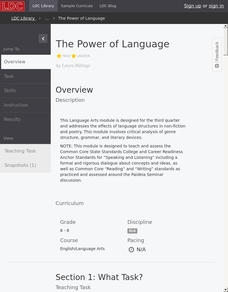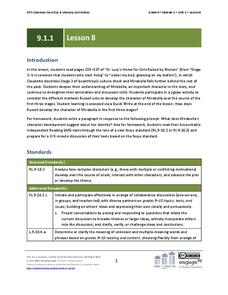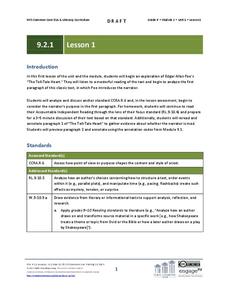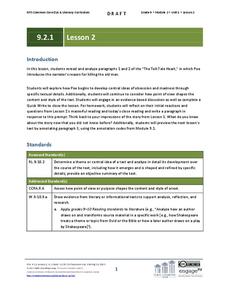Curated OER
Can You Haiku?
Everyone loves haikus! They're short, quick, and fun to write! Analyze the rules and conventions of haiku. Readers interpret examples of haiku and develop a vocabulary for writing haiku. Then they compose a haiku based on a personal...
Curated OER
Sonnet Explication
Learners analyze close readings of poems, looking up words in the dictionary, and discussing the major parts of dictionary definitions, including word origin and parts of speech. They examine sonnets, then compare/contrast their findings.
Curated OER
Biopoem: Bud, Not Buddy
Young poets focus on one character from a story they are reading, collect details, and use a biopoem template to analyze this character. The activity can be used with any text.
Curated OER
Analyzing the Use of Irony in a Short Story
Ninth graders examine how literature connects to real-life and see how irony aids in the development of theme. They read Shirley Jackson's The Lottery, and discuss elements of foreshadowing and situational irony. Then learners will write...
College Board
2004 AP® English Literature and Composition Free-Response Questions
Have you ever felt left in the dark? Scholars write essays after analyzing two poems pertaining to night and darkness. Pupils also read a passage and write an essay discussing the author's depiction of characters. A third essay allows...
Literacy Design Collaborative
The Power of Language
There is power in words. Readers take a close look at three text to determine how language structures affect meaning, including include poems and recipes. Scholars analyze the language authors use by circling important words, underlining...
Alabama Learning Exchange
Edgar Allan Poe's Journey Through Life and Literature
How was Edgar Allan Poe able to create "intriguing, memorable, and lasting literature"? To answer this question, learners analyze the syntax, diction, and characterizations in Poe's poems and short stories and compare the impact of these...
College Board
2011 AP® English Literature and Composition Free-Response Questions Form B
It's all in the technique. Authors use many techniques to express themselves using writing. Two of the three essay questions require scholars to analyze the literary devices used by the authors and write essays about how these techniques...
College Board
2003 AP® English Literature and Composition Free-Response Questions
The released 2003 AP® exam asks scholars to read and respond to two poems about the love god Eros. They also analyze the characterization and narrative in The Other Paris. A final essay question requires pupils to choose a novel or play...
College Board
2016 AP® English Literature and Composition Free-Response Questions
Have you ever met a wolf in disguise? The last essay question in the 2016 AP® English Literature and Composition Free-Response exam asks writers to think of deceitful characters and create essays describing why they carried out...
College Board
2015 AP® English Literature and Composition Free-Response Questions
It is a cruel world. Scholars create essays about a piece of work that describes what cruelty reveals about a character. A prompt from the 2015 AP® English Literature and Composition Free-Response Questions also contains two other essay...
College Board
2012 AP® English Literature and Composition Free-Response Questions
Does the world shape a person's character? Scholars choose a novel or play, take a close look, and write essays about how surroundings affect a character. Writers also analyze literary elements in an excerpt from a novel and poetic...
K20 LEARN
It’s Never Too Late to Apologize: Character Development and Theme in “The Scarlet Ibis”
Sometimes saying I'm sorry just doesn't cut it. Scholars examine a series of apology poems, songs, and stories and consider each speaker's regrets. Using what they have learned, they analyze James Hurst's short story, "The Scarlet Ibis,"...
Reed Novel Studies
Fuzzy Mud: Novel Study
Trouble always finds trouble. While avoiding a bully, Tamaya and Marshally from Fuzzy Mud take a trip through the off-limit woods and find themselves lost. To complete the worksheet study, scholars analyze several literary devices, learn...
Project Oceanography
Fish Shape
A fish's size, fins, and shape can tell us a lot about them! Learners explore fish anatomy to see how species use camouflage, scales, shape, and coloration to survive. The lesson includes advanced vocabulary such as fusiform shape,...
EngageNY
Grade 9 ELA Module 1, Unit 1, Lesson 8
You can often track a character's development based on others' reactions to their words or actions. Using Karen Russell's "St. Lucy's Home for Girls Raised by Wolves," ninth graders work in a jigsaw activity to analyze how Mirabella's...
EngageNY
Grade 9 ELA Module 2: Unit 1, Lesson 1
Once conceived, a guided set of literary analysis lessons will assist you day and night. Ninth graders look closely at "The Tell-Tale Heart" and analyze how Poe uses point of view to create questions about the narrator's sanity and...
EngageNY
Grade 9 ELA Module 2: Unit 1, Lesson 2
Make up your mind to complete a lesson plan about "The Tell-Tale Heart" and forever rid yourself of simple sentence structures. As ninth graders analyze the first two paragraphs of Edgar Allan Poe's short story, they consider how text...
Roy Rosenzweig Center for History and New Media
Patriots or Traitors - Point of View in the War for Independence
Patriots or traitors? Class members analyze images that present widely differing views of the Boston Tea Party, identifying the point of view of the image, the propaganda devices used, and the intended audience.
New York State Education Department
English Language Arts Examination: August 2017
Reading and comprehending a poem is a lot different than doing the same for a piece of fiction or an informational text. As part of a sample English language arts examination, readers put their skills to the test by reading passages in...
Reed Novel Studies
One Crazy Summer: Novel Study
Rita Williams-Garcia's One Crazy Summer describes three girls who go looking for their mother who ran out on them. Scholars complete a novel study guide with vocabulary exercises, character descriptions, and comprehension poems.
College Board
2006 AP® English Literature and Composition Free-Response Questions
Scholars select a novel or play and then craft an essay that describes the setting's role in the story. Pupils also create essays that analyze a poet's use of language and the values of characters in a novel excerpt.
College Board
2007 AP® English Literature and Composition Free-Response Questions
Scholars use the 2007 AP® English Literature and Composition Free-Response Questions to write essays examining how a character's tie to the past affects the story. The resource also requires pupils to write essays comparing two related...
Reed Novel Studies
Walk Two Moons: Novel Study
Enjoy solving riddles? Perhaps Sal, a character in Walk Two Moons, is the only one capable of understanding a mysterious message left on her doorstep. On a road trip with her grandparent, Sal tries to make sense of the bizarre world...
Other popular searches
- Analyze Poetry
- Analyze Poetry Third Grade
- Analyze Symbolism in Poetry
- How to Analyze Poetry
- Analyze Imagery in Poetry























